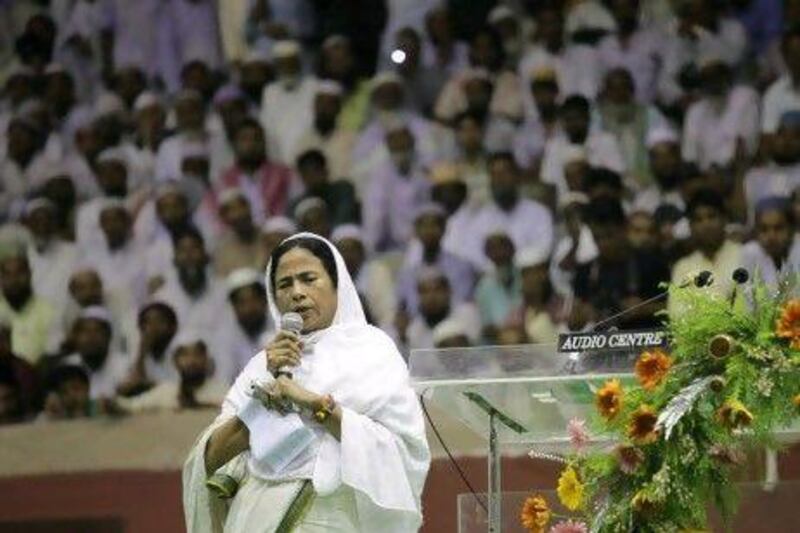NEW DELHI // Less than a year ago, Mamata Banerjee and her party, the Trinamool Congress, ended 34 years of Communist rule in the state elections of West Bengal on promises of a more liberal government.
But in a series of attacks on free speech, Ms Banerjee has started to narrow the democratic space sharply, prompting concern and anger from some citizens and political commentators in Kolkata, the state capital.
"We are having a bizarre administration here," said Buddhadeb Ghosh, a senior fellow at the Institute of Social Sciences in Kolkata. "She is totally unpredictable, totally erratic. This is almost a farcical government."
In perhaps the most publicised case, Ambikesh Mahapatra, a professor at Kolkata's Jadavpur University, was first assaulted by four Trinamool party members and then arrested on April 12 for forwarding an email to his friends containing a cartoon of Ms Banerjee.
The cartoon lampooned Ms Banerjee's decision to replace the central government's railway minister - who was a member of her party - with another Trinamool Congress member said to follow her commands more obediently.
Mr Mahapatra was charged with defamation and released on bail after a night in prison, although he told the media that he continues to "fear for my security". His four attackers were charged by police and released on bail.
His detention follows the arrest of another academic, Partho Sarothi Ray, a molecular biologist at the Indian Institute of Science Education and Research. Dr Ray was arrested on April 8 after protesting against the eviction of a slum in an eastern suburb of Kolkata.
Of the 69 people who were arrested during the demonstration, seven were held in prison on suspicion of having links with the Maoist guerrillas in West Bengal. Dr Ray was released after 10 days, but the six others remain in custody.
Ms Banerjee has also banned state-funded libraries from stocking English newspapers, and she has urged people at political rallies to not watch specific Bengali television channels that she claims are sponsored by the opposition Communist Party of India (Marxist).
Last Friday, she announced plans to launch a state-funded television channel and newspaper, alleging that other media outlets were obsessed with "negative" stories about her government.
Ms Banjeree accused the media of exaggerating issues such as the cartoon incident to "malign" her, and of colluding with the Communist Party to "think of ways to frame her".
The new state-funded media outlets, Ms Banerjee said, would be charged with "highlighting the performance of various government departments".
These incidents have only drawn further criticism upon Ms Banerjee.
In a stinging column in The Telegraph newspaper of April 15, the novelist Ruchir Joshi called for Ms Banerjee to resign after a what he described as a "grotesquely disastrous" term thus far. "[Y]ou were supposed to ensure that democracy and freedom of speech were… protected… even at a cost to yourself and your party," he said.
Mr Ghosh said the leader had defined her political identity solely in opposition to the Communists and carried her suspicion of Communists into government.
"She's the kind of person who will not tolerate any kind of opposition," said Mr Ghosh, a former member of West Bengal's civil service. "Even within the party, ministers in her cabinet cannot speak their mind. It's very peculiar."
Varun Rajiv, a corporate lawyer living in Kolkata, called Ms Banerjee's reactions "wildly disproportionate" symptoms of "a growing intolerance for even the most trivial forms of comment or criticism".
He said her decree that members of her party not socialise with members of the opposition Communist Party was "both unconstitutional and uncivilised".
In a letter to India's prime minister, Manmohan Singh, more than 50 academics from universities in India and abroad protested at the arrests of the two Kolkata professors. "The apparatus of the State," the letter read, "is using the law and its modes of intimidation" to stifle dissent.
Dr Ray, in a statement to the Kolkata Press Club on the day of his release from jail, said he had only stood by "the poor and the marginalised, and on the side of justice".
"If all this is a crime in the state of West Bengal today," he said, "then I can only say that we are living in dark days."





